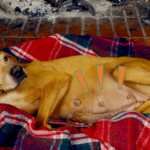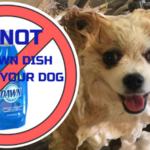Why Does A Dog Howl In Their Sleep
The Mystery of Canine Sleep: Exploring Why Dogs Howl in Their Sleep
Dogs are fascinating creatures with many unique behaviors that capture our attention and affection. One of the most curious aspects of their behavior is how they sleep, especially when they start to howl or whimper in their dreams. What could be causing these vocalizations? Are they simply random expressions of instinct or do they have deeper meanings? In this article, we will delve into the world of canine sleep and explore some possible reasons why dogs howl in their sleep.
Understanding Dog Sleep Patterns
Before we can tackle the question of why dogs howl in their sleep, we need to understand a bit about dog sleep patterns. Unlike humans who typically have one long period of deep sleep followed by several shorter cycles of light and REM (rapid eye movement) sleep, dogs have a different pattern. They tend to have multiple short periods of deep and light sleep throughout the day and night, with more REM sleep than humans. This means that dogs dream more frequently and vividly than humans, as their brains process sensory information from their waking experiences and consolidate memories during sleep.
According to some estimates, dogs can dream for up to two hours a day, depending on their age, breed, health status, and daily activities. During REM sleep, dogs may twitch, paw, lick, wag their tails, or make various sounds that indicate they are acting out dreams or reliving past events. However, not all dogs exhibit vocalizations during REM sleep, and some may even seem completely still or silent while sleeping.
Possible Reasons Why Dogs Howl in Their Sleep
Now that we know more about dog sleep patterns and dreaming behaviors, let’s explore some possible reasons why dogs howl in their sleep. While there is no definitive answer to this question yet, several theories have been proposed based on scientific observations and anecdotal evidence.
1. Instinctual Communication
One of the most common explanations for why dogs howl in their sleep is that they are expressing instinctual communication with their pack or other dogs. In the wild, dogs use vocalizations such as howls, barks, whines, and growls to signal their presence, location, mood, and intentions to other dogs. Howling can also serve as a way of reinforcing social bonds and coordinating group activities such as hunting or defending territory.
When dogs dream, they may be reliving some of these experiences and reacting to them in their sleep. Some researchers speculate that dogs who howl in their sleep may be trying to communicate with other dogs in their dreams or respond to imagined threats or opportunities. However, this theory has not been proven conclusively yet, as it is difficult to measure the content and meaning of dog dreams accurately.
2. Emotional Expression
Another possible explanation for why dogs howl in their sleep is that they are expressing emotional states such as joy, sadness, fear, or anxiety. Dogs are known for being highly sensitive to their surroundings and the emotions of their human and animal companions. They may pick up on subtle cues from the environment or from their own memories and react to them emotionally during sleep.
Some dog owners have reported that their dogs howl more often when they are stressed or anxious during waking hours, suggesting that this behavior may carry over into sleep. Similarly, some dogs may howl more when they are feeling happy or excited about something pleasant in their dreams. However, without a way of measuring dog emotions directly, it is hard to confirm this theory definitively.
3. Neurological Activation
A third possible explanation for why dogs howl in their sleep is that they are experiencing some kind of neurological activation that triggers vocalization. During REM sleep, the brainstem sends signals to various parts of the body to immobilize them temporarily so that animals do not act out their dreams physically and harm themselves or others. However, this process can sometimes malfunction and lead to abnormal movements or sounds.
Some researchers speculate that dogs who howl in their sleep may be experiencing similar glitches in their brainstem regulation, resulting in involuntary vocalizations. This theory is supported by studies of other animals such as rats and cats, which also exhibit vocalizations during REM sleep due to brainstem activation. However, more research is needed to confirm whether this applies to dogs as well.
Conclusion
In conclusion, the question of why dogs howl in their sleep remains a fascinating mystery that requires further investigation. While there are several theories that attempt to explain this behavior based on instinctual communication, emotional expression, or neurological activation, none of them has been proven definitively yet. It is possible that dogs howl in their sleep for a combination of these reasons or for different ones altogether.
As dog lovers and owners, we may never fully understand what goes on in our furry friends’ minds when they dream and howl. However, we can appreciate their unique personalities and behaviors and enjoy sharing our lives with them. Perhaps the next time you hear your dog howling in his sleep, you can smile and imagine him chasing rabbits or singing with wolves in a magical dream world. After all, life is better with a little mystery and humor.



